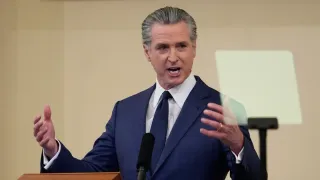February 23, 2015
US Names First Global Envoy for LGBT Rights
Jason St. Amand READ TIME: 2 MIN.
The United States named its first international envoy for gay rights Monday, tasking a veteran diplomat with leading U.S. efforts to fight violence and discrimination against LGBT individuals overseas.
Randy Berry, currently the consul general in the Netherlands, will promote human rights for lesbian, gay, bisexual and transgender individuals, Secretary of State John Kerry said. A longtime foreign service officer, Berry has served at U.S. posts in Bangladesh, Egypt, Uganda and South Africa, and speaks Spanish and Arabic.
"Defending and promoting the human rights of LGBT persons is at the core of our commitment to advancing human rights globally - the heart and conscience of our diplomacy," Kerry said in a statement. He cited overturning laws that still criminalize same-sex activity in more than 75 countries as a specific priority.
The State Department has said it planned to appoint an openly gay diplomat to the post.
Long in the works, Berry's appointment as a special envoy is the latest move by the Obama administration to make LGBT rights a prominent part of its human rights efforts around the world. In 2011, Secretary of State Hillary Rodham Clinton declared during a speech in Geneva that "gay rights are human rights, and human rights are gay rights." And earlier this year, the White House for the first time included human rights protection for LGBT people in its formal national security strategy.
"Nations that place LGBT people in the cross hairs of danger must know that the United States will not turn a blind eye," said Chad Griffin, president of the Human Rights Campaign, a gay rights group.
The announcement also comes amid a heightened public focus on transgender rights. Ash Carter, on his first overseas trip as defense secretary, suggested he was open to allowing transgender people to serve openly in the U.S. military.
White House spokesman Josh Earnest said Monday that President Barack Obama welcomed Carter's comments and agrees that all Americans qualified for military service should be able to serve.






